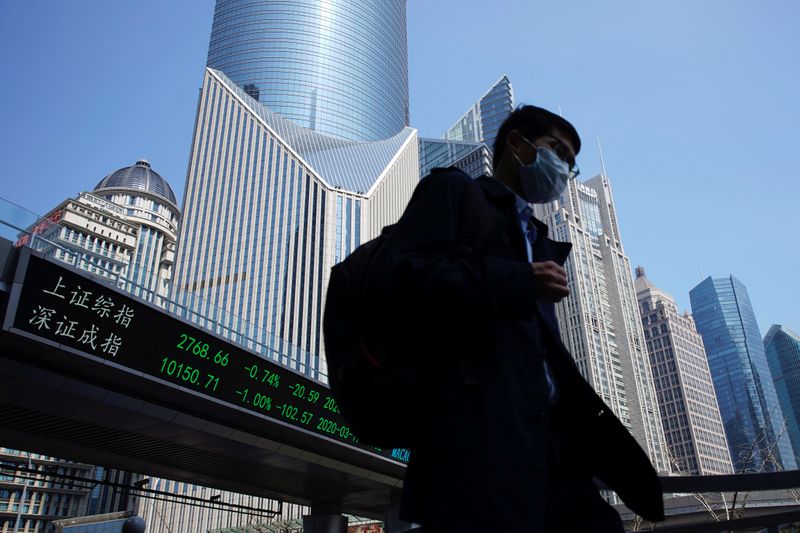By Wayne Cole and Scott Murdoch
SYDNEY/HONG KONG (Reuters) - Asian shares bounced on Monday as the Bank of Japan (BOJ) announced more stimulus steps to help cushion the economic impact of the coronavirus, but the recent weak run in the global oil price showed no signs of ending.
MSCI's broadest index of Asia-Pacific shares outside Japan (MIAPJ0000PUS) rose 1.8%, taking back a chunk of last week's 2.6% decline. Japan's Nikkei (N225) gained 2.6%, and Chinese blue chips (CSI300) 1%.
After a soft start, E-Mini futures for the S&P 500 (ESc1) climbed 0.85%, while EUROSTOXX 50 futures (STXEc1) added 2.6% and FTSE futures (FFIc1) 1.35%.
The BOJ matched market speculation by pledging to buy unlimited amounts of government bonds, removing its previous target of 80 trillion yen per year.
It sharply raised purchases of corporate and commercial debt, and eased rules for what debt would qualify.
Combined central bank and government actions around the world and falling rates of new coronavirus cases had helped spark some positive sentiment for equity investors, said Macquarie Private Bank divisional director Martin Lakos.
"People are cautious, but I think some investors are gauging that the worst might be over outside of another significant global outbreak of COVID-19," Lakos said.
"Saying people are optimistic is probably too strong but there's some confidence creeping back in to people's thinking."
Oil prices are on track for another soft week, with the commodity having fallen in eight of the last nine weeks. U.S. crude led the decline amid fears of another storage squeeze that saw prices plunge into negative territory last week after a slump in demand due to the pandemic and a glut of supply.[O/R]
U.S. crude (CLc1) was down 11% at $15.07 a barrel, while Brent crude (LCOc1) futures were down 3.9% at $20.60 a barrel
On the central bank front, the Federal Reserve and the European Central Bank meet later in the week, with the latter likely to do more bond buying.
"For the Fed, no further developments on QE or interest rates are expected, but we expect it to underline that its policies will be in place indefinitely to support the economy," ANZ wrote in a research note.
"We expect the ECB to raise the size of its emergency bond buying package (PEPP) by around 500 billion euros to 1.250 trillion and to continue pressing for a sizeable fiscal stimulus."
On the data front, the United States and European Union release GDP for the first quarter and the influential U.S. ISM survey on manufacturing.
Earnings season will be in full swing with around 173 companies in the S&P 500 reporting this week, including Apple (NASDAQ:AAPL), Amazon (NASDAQ:AMZN)
Analysts expect a 15% decline in S&P 500 first-quarter earnings, with profits for the energy sector estimated to slump more than 60%, raising fears of debt defaults, layoffs and possible bankruptcies.
Bond markets remain well supported by the truly massive easing under way from major central banks, which has seen U.S. 10-year yields (US10YT=RR) trade around 0.6% for a week or more.
The dollar has been generally well bid thanks to its safe haven status as the world's most liquid currency at times of stress, although moves have been relatively mild in recent weeks.
The dollar index (=USD) touched a three-week high at 100.86 on Friday before easing back to 99.73 on Monday amid an improvement in risk appetite.
The euro edged up to $1.088 (EUR=), having hit a one-month low of $1.0725 on Friday, while the dollar eased slightly on the yen to 107.24

Gold held at $1,722 per ounce